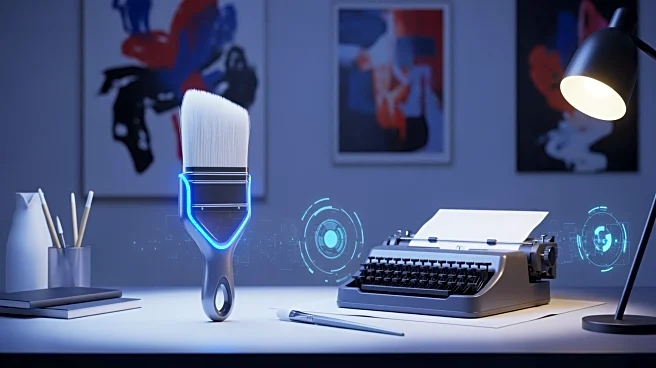What's Happening?
Vince Gilligan, renowned for his work on 'Breaking Bad' and 'Better Call Saul,' has launched a new Apple TV show titled 'Pluribus.' The show is notable for its explicit disclaimer stating it was 'made
by humans,' emphasizing the absence of generative AI in its creation. Gilligan has expressed strong opinions against AI, describing it as an 'expensive and energy-intensive plagiarism machine.' He likens AI-generated content to 'an endlessly regurgitated loop of nonsense,' underscoring his preference for human creativity. 'Pluribus' marks Gilligan's return to science fiction and features Rhea Seehorn, a 'Better Call Saul' alum, as a romantasy author facing an alien invasion.
Why It's Important?
The release of 'Pluribus' comes at a time when the entertainment industry is increasingly exploring AI technologies for content creation. Gilligan's stance highlights a growing debate about the role of AI in creative fields, raising questions about originality and the value of human input. By choosing to emphasize human involvement, Gilligan sets a precedent that could influence other filmmakers and creators to prioritize human creativity over AI. This decision may impact industry standards and audience expectations, potentially leading to a broader discussion on the ethical implications of AI in media production.
What's Next?
As 'Pluribus' gains attention, it may spark further conversations within Hollywood and the broader entertainment industry about the use of AI in content creation. Filmmakers and studios might consider adopting similar disclaimers to differentiate human-made content from AI-generated works. The show's reception could influence future projects, encouraging creators to explore themes of human versus machine creativity. Additionally, Gilligan's outspoken views may inspire other industry leaders to voice their opinions on AI, potentially shaping policy and practices regarding technology use in media.
Beyond the Headlines
Gilligan's critique of AI touches on broader ethical and cultural concerns about technology's impact on creativity and originality. His comments reflect a resistance to the homogenization of content that AI might bring, advocating for the preservation of unique human perspectives in storytelling. This stance could contribute to a cultural shift, where audiences and creators alike prioritize authenticity and human expression over technological efficiency. The show's emphasis on human involvement may also resonate with viewers who value traditional creative processes, fostering a deeper appreciation for the artistry behind media production.











